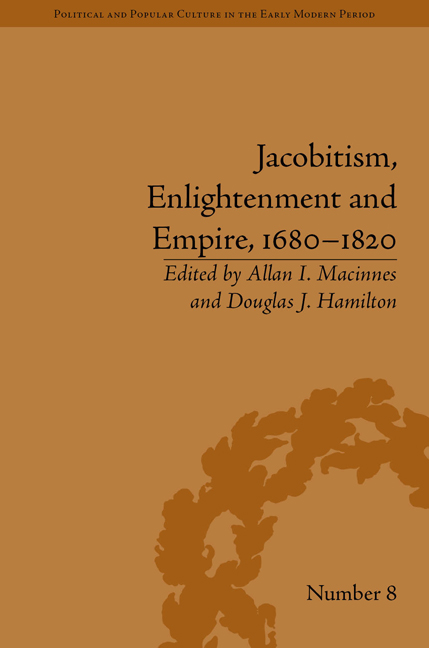Book contents
- Frontmatter
- CONTENTS
- List of Contributors
- List of Tables
- Introduction: Identity, Mobility and Competing Patriotisms
- 1 Jamie the Soldier and the Jacobite Military Threat, 1706–27
- 2 Simply a Jacobite Heroine? The Life Experience of Margaret, Lady Nairne (1673–1747)
- 3 Missionaries or Soldiers for the Jacobite Cause? The Conflict of Loyalties for Scottish Catholic Clergy
- 4 English Liturgy and Scottish Identity: The Case of James Greenshields
- 5 ‘Let Him be an Englishman’: Irish and Scottish Clergy in the Caribbean Church of England, 1610–1720
- 6 Scotland, the Dutch Republic and the Union: Commerce and Cosmopolitanism
- 7 Clearing the Smokescreen of Early Scottish Mercantile Identity: From Leeward Sugar Plantations to Scottish Country Estates c. 1680–1730
- 8 Union, Empire and Global Adventuring with a Jacobite Twist
- 9 John Drummond of Quarrel: East India Patronage and Jacobite Assimilation, 1720–80
- 10 William Playfair (1759–1823), Scottish Enlightenment from Below?
- 11 The Visionary Voyages of Robert Burns
- 12 ‘Defending the Colonies against Malicious Attacks of Philanthropy’: Scottish Campaigns against the Abolitions of the Slave Trade and Slavery
- Abbreviations
- Notes
- Index
8 - Union, Empire and Global Adventuring with a Jacobite Twist
- Frontmatter
- CONTENTS
- List of Contributors
- List of Tables
- Introduction: Identity, Mobility and Competing Patriotisms
- 1 Jamie the Soldier and the Jacobite Military Threat, 1706–27
- 2 Simply a Jacobite Heroine? The Life Experience of Margaret, Lady Nairne (1673–1747)
- 3 Missionaries or Soldiers for the Jacobite Cause? The Conflict of Loyalties for Scottish Catholic Clergy
- 4 English Liturgy and Scottish Identity: The Case of James Greenshields
- 5 ‘Let Him be an Englishman’: Irish and Scottish Clergy in the Caribbean Church of England, 1610–1720
- 6 Scotland, the Dutch Republic and the Union: Commerce and Cosmopolitanism
- 7 Clearing the Smokescreen of Early Scottish Mercantile Identity: From Leeward Sugar Plantations to Scottish Country Estates c. 1680–1730
- 8 Union, Empire and Global Adventuring with a Jacobite Twist
- 9 John Drummond of Quarrel: East India Patronage and Jacobite Assimilation, 1720–80
- 10 William Playfair (1759–1823), Scottish Enlightenment from Below?
- 11 The Visionary Voyages of Robert Burns
- 12 ‘Defending the Colonies against Malicious Attacks of Philanthropy’: Scottish Campaigns against the Abolitions of the Slave Trade and Slavery
- Abbreviations
- Notes
- Index
Summary
The transoceanic operations of Scottish and Ulster Scottish commercial networks in the eighteenth century can be viewed as enlightened as well as exploitive entrepreneurship. At the same time, the participation of Scots in Empire has become a distinctive intellectual inquiry that has been rooted in demographic studies, but has also scrutinized the movement of goods and ideas as well as people. However, major questions remain about the extent and impact of Scots engaging with Empire after the Treaty of Union in 1707. Much can be made of Scottish achievements as tobacco lords in the American South, as sugar barons in the Caribbean, as African slavers, as Indian nabobs or as military and naval officers. Yet elite Scots also bought into Empire indirectly through the acquisition of stocks and shares in companies venturing to the East Indies, West Africa and the South Seas; they likewise acquired government bonds and even lottery tickets. Global adventuring was not always lucrative, however, and was attended with high personal and financial risks.
The capacity of Scots to grasp opportunities opened up after 1707 in Asia, Africa and the Americas built upon the global aspirations of Scottish entrepreneurs before Union; aspirations that were sustained despite discriminatory trading measures promulgated by the English Parliament and despite the failure of the Scots to develop Darien on the Panama Isthmus as a transoceanic entrepôt in the 1690s.
- Type
- Chapter
- Information
- Jacobitism, Enlightenment and Empire, 1680–1820 , pp. 123 - 140Publisher: Pickering & ChattoFirst published in: 2014



